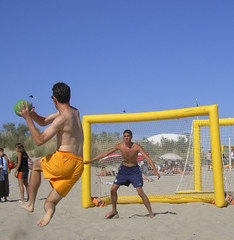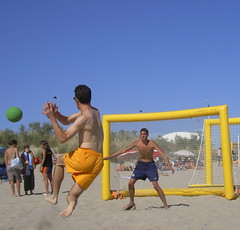Article By Terry Frei, special to ESPN.com
This is not going to be a hatchet job.
Many of the denunciations of Gary Bettman's tenure as National Hockey League commissioner rely on tired, cliched and unreasonable assumptions from those who can't reconcile the sport's roots and traditions with modern reality. I often have been a Bettman defender over the years, and in many ways will continue to be.
Yet this also is inescapable: For the good of the NHL, the game and even of Bettman himself, the commissioner should step down once a new collective bargaining agreement is signed.
That would allow the relaunch and the healing to take place without his lightning-rod presence as a distraction. The same goes for NHL Players Association head Bob Goodenow, whose dogmatic and principled inflexibility on the salary cap issue was admirable yet ultimately unproductive given the likely terms of the upcoming settlement.
Bettman brought the NHL into the 21st century, literally and figuratively, which was quite a leap considering that on many fronts the league was operating in the 19th century when he took over.
Primarily because his lockout strategy "worked" – the league brought the NHLPA to its knees, forcing the union to accept the unacceptable – Bettman can leave with the reputation of having obtained what the hard-liners demanded and having "won" this battle.
He can retire on top, so to speak.
All along, he said the system needed to be fixed, and only a blinkered fool wouldn't admit that a hybrid salary cap/luxury tax system with a ceiling in the neighborhood of $36 million is a victory for Bettman and the owners. Of course, that raises the question of whether franchises whose payroll costs will be drastically cut will roll back ticket prices – and roll them back significantly, not just with slight and mostly cosmetic markdowns.
The problem is, the victory is Pyrrhic.
Because of the dark season, and the silly holding-of-breath that led to it, the NHL's reputation has sunk to new lows, and that's saying something.
Advertisers and sponsors are both wary and maybe even embarrassed.
Season-ticket holders have every reason to wonder about the wisdom of their investments and their loyalties. It's hard to decide whether NBC's television deal is more like the arrangement Tom Sawyer made to get his fence whitewashed or like the let-us-on-the-air-please deals the XFL and Arena Football had with the network. And ESPN, so linked to hockey since the days when both the Hartford Civic Center and the network had just opened their doors, has decided not to exercise its option for next season. So if the game ultimately does return to the cable network so tied to its U.S. image, it will be under a deal more like NBC's than a traditional rights agreement.
That all has happened on Bettman's watch.
Can time heal?
Maybe.
If the league comes back with lower ticket prices and even increased parity because of a spreading out of talent, and with a more entertaining product because of new rules, perhaps. But what many seem to be overlooking is that in markets such as Detroit, Colorado, Philadelphia and Toronto, fans are accustomed to ambitious ownerships and talent-laden rosters, and while they grumbled about ticket prices and frequent underachievement, they don't mind paying for a superior product.
Also, the chances for healing will be far greater, and the timetable advanced, if Bettman isn't around to continue to take the heat for the game's perceived problems, all of which aren't going to go away.
In his 12-year tenure, Bettman has been derided as "a New York lawyer" and "a basketball guy." In hockey, those terms can be pejoratives, especially because the former sometimes can be code words used to cloak anti-Semitism.
The examples of players demonizing Bettman for his role in the lockout, citing his lack of hockey background and perceived lack of affection for the sport itself, are legion. And that was comical. Bettman cared only about money and not about hockey? This was coming from men in a sport in which salaries had skyrocketed under Bettman's tenure, who were part of a union that got mad at members for accepting "hometown" discounts rather than ruthlessly seeking all they could get to nudge the benchmarks up, and even sniffed at owners for being cheap if they didn't throw money at them as they were about to become free agents.
Bill Guerin, one of the NHLPA's officers, has a patent on that one.
But that's the business. The players and the union want the NHL to be about "The Game" when it serves their purpose, but they want it to be "The Business" when the talk turns to money.
A basketball guy? Bettman couldn't dunk a basketball with the aid of four Revised Statutes volumes stacked up as a springboard. So the "basketball man" knock has nothing to do with the New York City native's athletic background but rather with his stint as an executive serving under NBA commissioner David Stern when that league introduced its salary cap and also entered a new era of prosperity.
The Bettman era has been a mixed bag. Bettman's Folly was overexpansion, which failed because it didn't secure the league a lucrative national television contract. But he did bring the league forward in many ways, all the while drawing fire for what he isn't. He isn't a Canadian or at least an American with hockey in his pedigree, he isn't pandering to the media, he isn't capable of coming off as warm and fuzzy and disarming.
The lockout is about a lot more than Bettman vs. Goodenow, but that confrontation is very real and at least plays a role in the dispute that led to the cancellation of the season. Only the two men know how much the personal pettiness has affected the process, but it's clear that Bettman resented what he believed to be the NHLPA's lack of responsiveness to the league's financial situation over the past five years, since the CBA was last renewed. Goodenow's position long has been that the free market should set the benchmarks in hockey – whether that's what owners charge for dasher-board advertising, broadcast rights and ticket prices or whether salaries continue to escalate (or undergo a market correction, which seemed to be the case as the end of the CBA approached).
And here's the most damning indictment: While the two sides were playing line-in-the-sand playground games last winter, the clock was running. If Bettman and Goodenow could have set aside their personal rivalry – and there is one, even if they won't admit it – to lead their factions back to the bargaining table for prolonged talks, last season could have been saved and the scarring reduced. Sure, the posturing and petulance on both sides affected the specific terms of the ultimate settlement, but serious negotiation would have led to this hybrid cap/tax system long ago. And saving the season would have overshadowed gains here and there.
Bettman and Goodenow were doing their jobs, and that's the business world; but they could have operated with much more urgency this past winter, and I still think their deep-seated rivalry was a major reason for their dual irresponsibility.
Bettman should have told the hard-line wing of low-ambition owners it wouldn't be allowed to carry the day, that reasonable negotiations would benefit all. Goodenow was the revolutionary leader who took over for a corruption-plagued regime that disgracefully looked out more for itself than for the players it represented. While the pendulum arguably swung too far the other way, NHL owners with a sense of history understand that many of the recent problems came because their predecessors benefited from the union's corruption.
Under Goodenow, the players had a gravy train for a long time, and he also could walk out with a track record of accomplishment for his constituency.
Bettman and Goodenow have had their runs.
After the new CBA is signed, they should quit.
Terry Frei is a regular contributor to ESPN.com. He is the author of "Third Down and a War to Go" and "Horns, Hogs, and Nixon Coming."





